At a time when the “climate generation” is making its voice heard, an international architectural competition between students, the Solar Decathlon Europe (SDE), has just opened its doors to the public in Wuppertal, Germany. It puts innovative and energy-efficient buildings in competition.
After a first participation in the Canopéa project, winner in 2012, DualSun and its innovative solar technology DualSun SPRING is selected by two teams for the 2022 edition: the AuRA team (France) and the Levelup team (Germany).
This competition is perfectly in line with DualSun’s vision of making the buildings in which we live energy self-sufficient through the local production of heat and electricity.
An architectural competition to make buildings energy positive
The Solar Decathlon Europe is an international architecture competition for students. 18 teams are challenged to design, build and operate innovative and energy-efficient buildings powered only by renewable energy. The theme of this 2022 edition is renovation.
Technically, the 18 teams have two years to design and build a habitat with a very low environmental impact that they will then have to dismantle and reassemble on site in record time.
The French team AuRA and its prototype “Agathe & Sophie
The AuRA team from Auvergne-Rhône-Alpes will present its prototype project “Agathe & Sophie” to try to win the competition. In this video, you can see our 8 PVT DualSun solar panels in full construction!
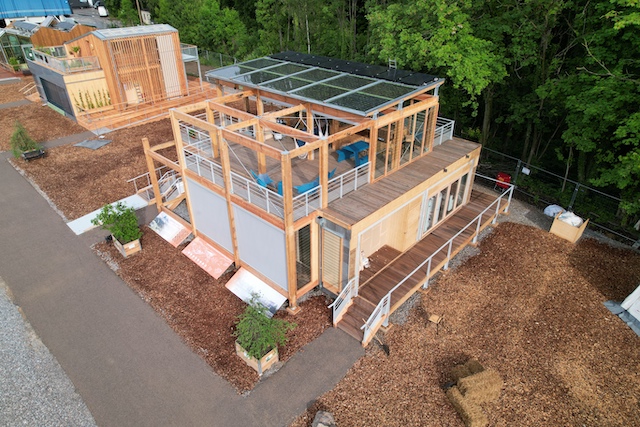
Design a sober building anchored in the territory
The AuRA project focuses on the building that is part of its territory, which integrates economic and energy performance constraints using resources linked to the territory. They are thus developing a reflection on how to live in our territories tomorrow.
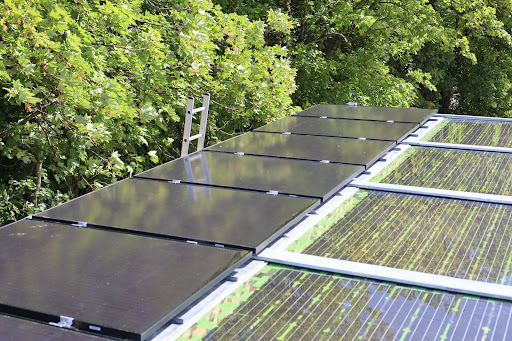 The initial project of the AuRA team is located in the Arzelier pass near Grenoble, which has been in economic decline since the closure of its ski lifts in 2018. The AuRA team aims to revitalize this area and develop its potential to welcome new year-round residents.
The initial project of the AuRA team is located in the Arzelier pass near Grenoble, which has been in economic decline since the closure of its ski lifts in 2018. The AuRA team aims to revitalize this area and develop its potential to welcome new year-round residents.
To do this, the team is developing its concept on a former hotel characteristic of the 1970s. It will be renovated while integrating housing, common spaces and activities using only geo or biosourced materials, as well as reused materials.
To do this, the team is working at three different scales:
- The territorial scale: highlighting possible alternatives to the Metropolises by building on existing building stock in suburban and rural areas.
- The local scale: encouraging the development of strong, fertile and self-sufficient communities.
- The architectural scale: to propose an architectural project based on sobriety, energy efficiency and the use of renewable energy.
The AuRA team is composed of different groups of students. On the one hand, those of the École Nationale Supérieure d’Architecture de Grenoble (ENSAG), and on the other, students from the Grands Ateliers Innovation Architecture (GAIA). These two institutions were also involved in the previous SDE adventures. For example, they won the 2010 edition and took 4th place at the 2012 edition in Madrid. In 2014, they worked on the organization of the SDE in Versailles.
The German team Levelup
The German Levelup team consists of students from the Technical University of Applied Sciences in Rosenheim. Supported and sponsored by numerous industrial and commercial partners, the Levelup team previously participated in the Solar Decathlon Europe 2010 in Madrid, where they achieved 2nd place.
Building design with modular additions
The Levelup project is the addition of extra floors to a type of building that is very energy intensive and widespread in Germany since it constitutes the majority of the building stock built between the 1950s and 1970s.
This type of building is ideal for the addition of several floors because of their strong supporting structures.
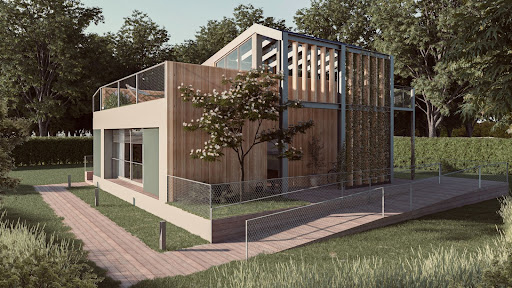
The experiment was done in the Ludwigsfeld district of Nuremberg. The team is now to realize it again on the Solar Decathlon.
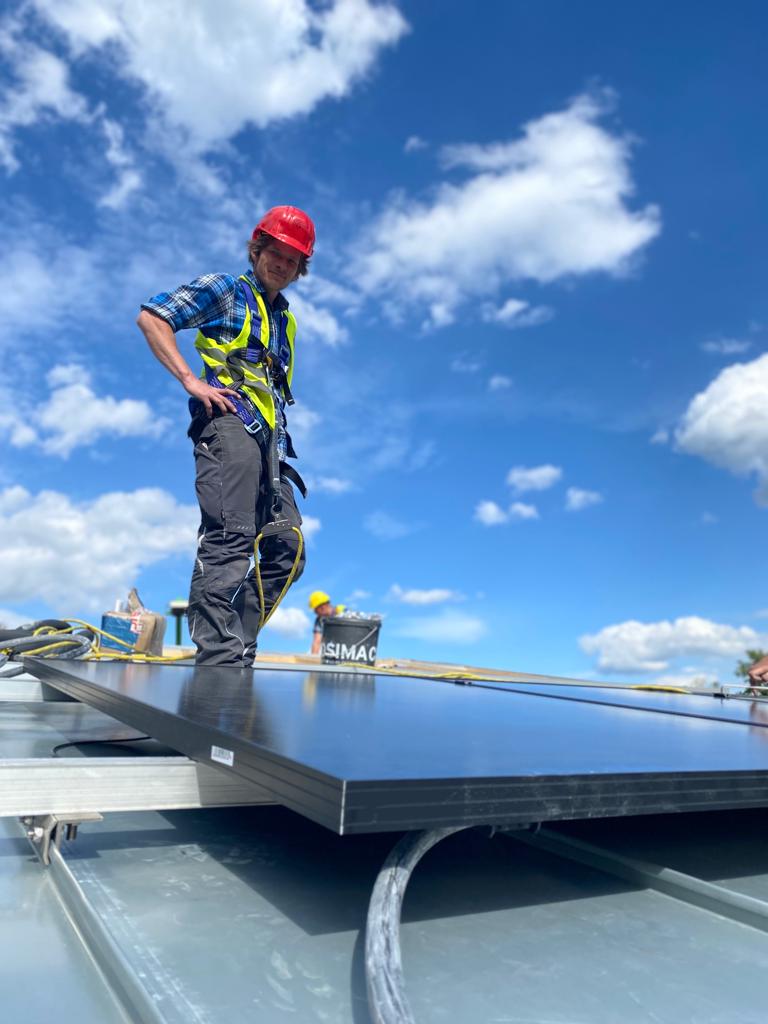 The signature of the Levelup team is the modular and flexible addition of floors in lightweight wood construction, adaptable to almost any building constructed between the 1950s and 1970s. Prefabricated modules (kitchen, bathroom, stair core) with standardized dimensions allow for easy transportation, shortened construction times and reduced costs.
The signature of the Levelup team is the modular and flexible addition of floors in lightweight wood construction, adaptable to almost any building constructed between the 1950s and 1970s. Prefabricated modules (kitchen, bathroom, stair core) with standardized dimensions allow for easy transportation, shortened construction times and reduced costs.
From an architectural point of view, the Levelup prototype is characterized by a load-bearing structure fixed to the building. This creates a connection between the existing building and the added floors. On the street side, there are photovoltaic systems integrated into the building.
For energy production, the presented prototype has three different photovoltaic systems. First, 12 of our DualSun PVT collectors on the roof. Second, semi-transparent photovoltaic panels on the roof of the greenhouse. Finally, building-integrated photovoltaic panels on the façade.
DualSun hybrid solar panels (PVT)
These serious and successful student projects support the importance of renewable energy and self-consumption in efficient housing models.
This competition is perfectly in line with DualSun’s vision since 2010, which is to work on decarbonized buildings. Based on the evidence that electricity and hot water are part of our daily needs, DualSun has designed the world’s first certified hybrid solar panel: the SPRING 2-in-1 panel.
The DualSun SPRING panel allows for the double self-consumption of electricity and hot water, thanks to solar energy. It ensures more energy savings. In fact, with a SPRING hybrid installation, a household’s annual energy bill can be reduced by up to 70%. Taking into account the initial cost of the installation, this hybrid solution allows to save 22.5 k€ over 25 years: That’s 32% more savings compared to a classic PV installation.
Therefore, with a SPRING installation in double self-consumption the annual bill of the household is reduced by 70% (compared to 50% with photovoltaic alone). This means savings of up to 1,300€ including the resale of the surplus.
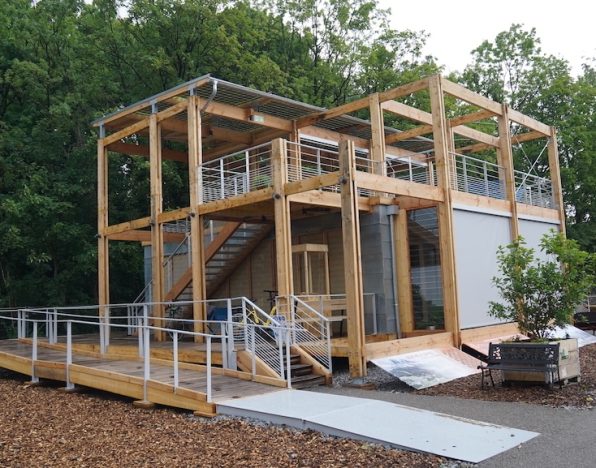
Aucun commentaire pour le moment